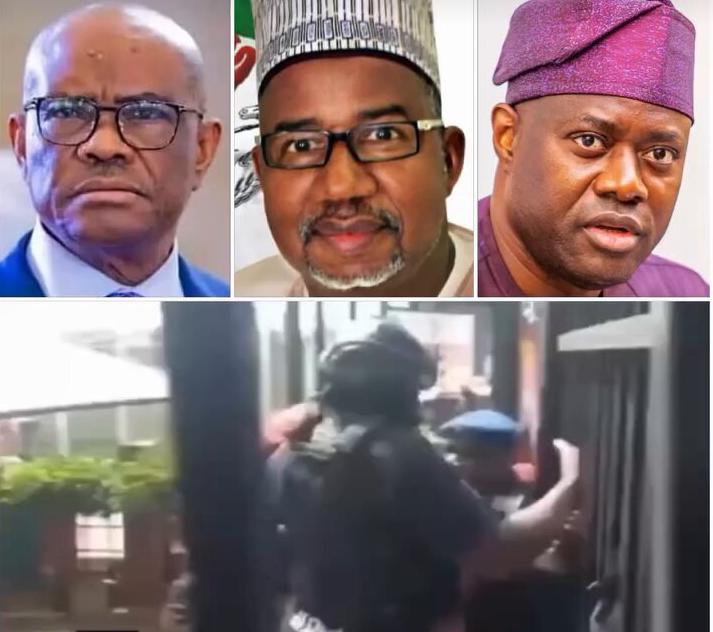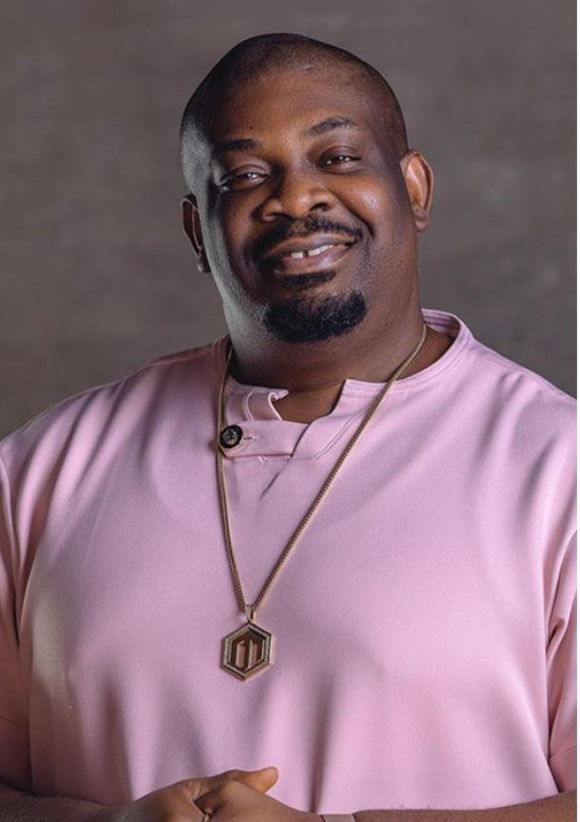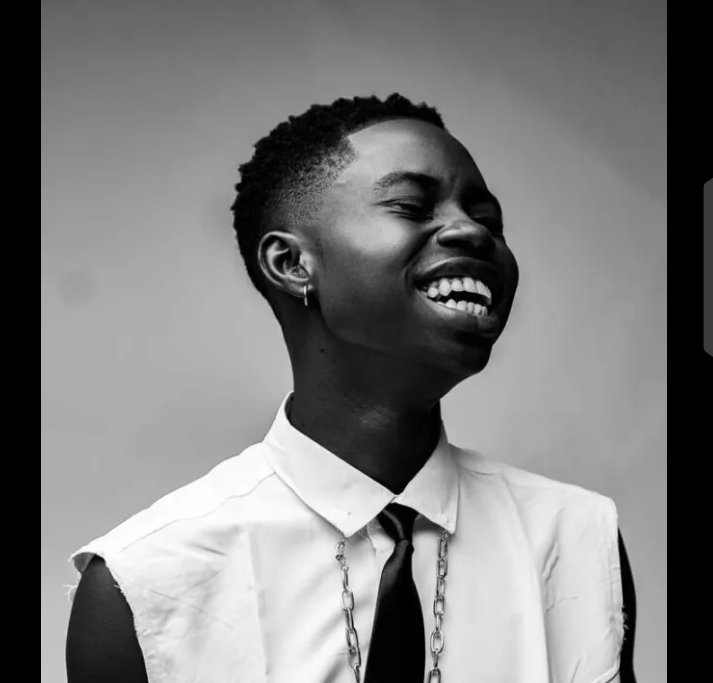
Teargas, Tension, and Turmoil: Wike, Makinde, Bala in Fierce Battle for Control of PDP Secretariat

A dramatic power tussle unfolded on Tuesday at the National Secretariat of the Peoples Democratic Party (PDP) in Abuja, as FCT Minister Nyesom Wike clashed with Oyo State Governor Seyi Makinde and Bauchi State Governor Bala Mohammed in what party insiders have described as the most chaotic confrontation in the PDP’s recent history. What began as a seemingly routine day at the Wuse Zone 5 complex rapidly degenerated into a spectacle of political muscle-flexing, competing authority, and a shocking display of law enforcement partisanship.
According to ARISE News correspondent Mary Chinda, who was on the ground as the confrontation escalated, security operatives loyal to both sides engaged in an intense face-off, with teargas being fired from multiple directions as each faction made frantic attempts to seize and secure the building. Witnesses at the scene described the air around the secretariat as “foggy and choking,” with staff and passersby fleeing the vicinity as clouds of teargas engulfed the area. For several minutes, the entire street was thrown into confusion as officers struggled for dominance while political supporters shouted, jeered, and scrambled for safety.
The clash was triggered by an attempt by Governor Seyi Makinde to enter the headquarters with Taofeek Arapaja, who was recently elected as the new National Secretary of the PDP. Makinde, accompanied by Governor Bala Mohammed, insisted that the party must respect its internal processes and inaugurate Arapaja without delay. But standing firmly on the other side was Nyesom Wike, flanked by Samuel Anyanwu, the embattled National Secretary who maintains that he remains the valid occupant of the office until December 8, 2025.
Anyanwu, who has been at the center of the leadership controversy for weeks, argued forcefully that no election or replacement can oust him before the expiration of his tenure. Wike, backing him with unwavering conviction, took control of a section of the secretariat and refused to vacate the premises, saying that the PDP must not “reward illegality under any disguise.” For hours, both camps occupied different parts of the building, blocking entrances, issuing statements, and attempting to physically secure office spaces to assert legitimacy.
The situation reached its peak when security personnel reportedly loyal to Wike attempted to reinforce their presence, prompting a counter-move from the police escorts attached to Governors Makinde and Bala. What followed was an eruption of chaos—harsh shouts, scuffles, and then the deafening blasts of teargas canisters being fired into the air. Eyewitnesses said it was impossible to tell which side fired first, but within seconds, the scene had transformed into a battlefield, with journalists running for cover and party staff trapped amid the fumes.
Inside the secretariat, the atmosphere was equally tense. Arapaja’s supporters insisted that the party’s recent national decisions must be implemented immediately to restore order and unity. On the other hand, Anyanwu’s loyalists argued that the PDP constitution cannot be bent for political convenience and accused Makinde’s camp of attempting a forceful takeover. The competing claims further deepened the divisions within the party, already battling internal fractures ahead of major political decisions leading up to the 2027 elections.
By midday, the PDP secretariat had effectively become a symbol of the party’s internal turmoil—crowded, barricaded, and surrounded by security operatives whose actions raised serious questions about neutrality. Several party chieftains who arrived to assess the situation expressed frustration and bewilderment at the level of hostility on display. Many feared that the confrontation, if not immediately addressed, could plunge the opposition party into deeper crisis at a time when unity is crucial.
Some leaders openly criticized the Nigeria Police Force for what they described as selective intervention. According to them, officers deployed to maintain peace appeared to take sides at different moments, reinforcing the chaos rather than preventing it. This allegation has sparked a fresh wave of concern about the influence of political actors over security institutions—an issue that has long plagued Nigeria’s democratic environment. Party elders are now calling for an emergency meeting of the National Executive Committee (NEC) to take decisive action before the crisis spirals out of control.
Political analysts watching the drama unfold say the clash reflects a larger ideological and power struggle within the PDP, one that pits entrenched interests against reform-driven elements seeking to reposition the party. For months, tension had been brewing beneath the surface as different blocs within the PDP scramble to assert dominance ahead of internal restructuring and strategic decision-making for the next electoral cycle. Tuesday’s violent confrontation, however, marked the first time the simmering rivalry spilled so overtly into public view.
The role of Nyesom Wike in the unfolding internal crisis has attracted particular scrutiny. Once a powerful backbone of the PDP, his appointment as FCT Minister under the ruling All Progressives Congress (APC) administration sparked widespread criticism and speculation about his loyalty. His continued influence within the PDP has remained a contentious issue, with many party members accusing him of destabilizing the opposition from within. The clash at the secretariat, they argue, is a direct consequence of that lingering conflict of interest.
On the other hand, Makinde and Bala’s camp insists that the PDP must chart a new course that distances the party from individuals whose actions appear contradictory to its overall goals. They view the insistence on retaining Anyanwu as National Secretary as a deliberate obstruction to the party’s reformation efforts, especially as the PDP seeks to regain national relevance after back-to-back electoral losses.
As evening approached, the secretariat remained tense, with entry heavily restricted and rival supporters ordered to disperse. The PDP national leadership, visibly concerned about the embarrassment the incident has caused, promised to issue an official statement after consultations with key stakeholders. However, many fear that the clash marks only the beginning of a broader war for control within the party—one that could shape the PDP’s future for years to come.
For now, the images of teargas, confrontation, and a battle for office space stand as a stark reminder of the depth of division within Nigeria’s main opposition party. As members and supporters watch anxiously, one question looms large: can the PDP resolve its internal conflict before it tears the party apart from the inside? The answer may well determine the fate of the party long before the 2027 elections arrive.
Wike and Seyi Makinde clashing currently in Abuja, over occupation of the PDP National Secretariat.
— 👑S.A.L.A.K.O🕊 (@UnkleAyo) November 18, 2025
I don't understand this country.
You work for an APC government, the PDP expelled you - but you're still fighting to hold onto PDP.
Who does Wike thinks that he is? pic.twitter.com/ffuCu8feQ0


